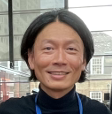- Lectures
- Institute of Biomedical Sciences
- Location
B1C Lecture Room, IBMS
- Speaker Name
Dr. Yung-Yao Lin (Queen Mary Univ. of London)
- State
Definitive
- Url
Progress in finding a cure for neuromuscular disorders (NMDs) has been hampered by the lack of human-relevant microphysiological systems for modelling pathophysiological mechanisms and assessing efficacy of therapeutic strategies. Duchenne muscular dystrophy (DMD), caused by mutations in the dystrophin gene, is the most common inherited NMD in childhood. DMD is characterised by progressive skeletal muscle weakness and wasting leading to loss of ambulation with reduced life expectancy. By integrating our expertise in human pluripotent stem cells, genome editing, optogenetics and bioengineering, we developed the first light-controllable neuromuscular circuit models for DMD with CRISPR-corrected isogenic controls. These human-relevant microphysiological models allowed us to assess candidate drugs for ameliorating neuromuscular defects and motor dysfunction in DMD. Furthermore, our unpublished results demonstrate that engineered human myogenic cells in hydrogels can generate innervated vascularised myofibers within dystrophic mouse muscle upon long-term engraftment and repopulate muscle stem cell niche. Ultimately, our research may contribute to improved accuracy for drug discovery and validation with reduced time and costs, as well as advances in regenerative medicine.









 Home
Home

